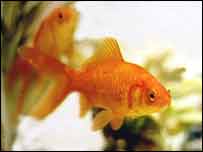|
Fish are socially intelligent creatures who do not deserve their reputation as the dim-wits of the animal kingdom, according to a group of leading scientists.
Rather than simply being instinct-driven, the group says fish are cunning, manipulative and even cultured.
The three experts from the universities of Edinburgh, St Andrews and Leeds said there had been huge changes in science's understanding of the psychological and mental abilities of fish in the last few years.
Writing in the journal Fish and Fisheries, biologists Calum Brown, Keven Laland and Jens Krause said fish were now seen as highly intelligent creatures.
They said: "Gone (or at least obsolete) is the image of fish as drudging and dim-witted pea-brains, driven largely by 'instinct',' with what little behavioural flexibility they possess being severely hampered by an infamous 'three-second memory'.
Behaviour patterns
"Now, fish are regarded as steeped in social intelligence, pursuing Machiavellian strategies of manipulation, punishment and reconciliation, exhibiting stable cultural traditions, and co-operating to inspect predators and catch food."
Recent research had shown that fish recognised individual "shoal mates", social prestige and even tracked relationships.
Scientists had also observed them using tools, building complex nests and exhibiting long-term memories.
The scientists added: "Although it may seem extraordinary to those comfortably used to pre-judging animal intelligence on the basis of brain volume, in some cognitive domains, fishes can even be favourably compared to non-human primates."
They said fish were the most ancient of the major vertebrate groups, giving them "ample time" to evolve complex, adaptable and diverse behaviour patterns that rivalled those of other vertebrates.
"These developments warrant a re-appraisal of the behavioural flexibility of fishes, and highlight the need for a deeper understanding of the learning processes that underpin the newly recognised behavioural and social sophistication of this taxon," said the scientists.
Top
|
